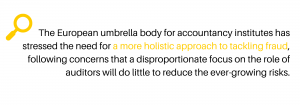23 April 2021 — News

This article reflects on our original paper Fraud: Recommendations to strengthen the financial reporting ecosystem which explains why it is crucial that all stakeholders – and not only accountants – come together to address fraud issues. The article was originally published on ICAEW – Insights.

Attempts at a European level to present strategies for tackling corporate fraud have moved up a notch with the publication of Accountancy Europe’s recommendations to strengthen the financial reporting ecosystem against fraud, amid concerns that the pressure on business due to COVID has opened up new opportunities for economic crime.
The pandemic has created new opportunities to commit fraud, making companies more vulnerable to corporate failure, the report warns. The latest findings from PwC’s Global Economic Crime Survey found that, in the UK alone, 56% of organisations had experienced fraud in the past two years – the highest level ever recorded – a figure that the firm expects will be eclipsed in the coming months.
“Auditors can play a crucial role in tackling fraud and stakeholders expect that auditors should be doing more or better in this area,” the Accountancy Europe report says. However, all key players – including companies’ boards and management, legislators, standard setters and regulators – must take a coordinated approach to achieve tangible results in tackling fraud, it warns.
Andrew Hobbs, EMEIA Public Policy leader for EY and a corporate governance specialist at the firm, contributed to the Accountancy Europe project, aimed predominantly at policymakers and spoke to ICAEW Insights in a personal capacity. “When frauds come to light, the first question is often ‘where were the auditors?’ Of course, auditors have a role to play, but auditors are only one of the lines of defence and management: internal audit and the audit committee also have critical roles to play.”
Hobbs is acutely aware of the sensitivities at play, as a series of recent scandals including Patisserie Valerie and Carillion in the UK and others further afield have placed the role of auditors under increasing scrutiny.
He points out: “We’ve had a series of audit reforms over the last 10 or 15 years, yet failures continue to happen. The question is, are we doing sufficient analysis to really understand the root causes and therefore what the solutions are? Are we looking holistically at the role of management, boards, audit committees, regulators and of course auditors?”
Hobbs is adamant he’s not making excuses for auditors. “The question is whether the solutions best address the problems. Some critics say let’s do more of the same. But as Einstein said, insanity is doing the same thing over and over again and expecting a different result.”
“It seems to me like society is fed up with being surprised by failures,” Hobbs continues. “The Accountancy Europe work is about saying, we hear you and here are some ideas to try and address the problems you’ve rightly identified. As auditors, we stand ready to play our part, but we are only going to improve in the battle against fraud if we work together.”
The recommendations proposed by Accountancy Europe range from legislation that requires companies to have and publicly report on a fraud risk management system, a greater focus on senior management fraud including efforts to strengthen the functioning of audit committees and ensure their independence from management, and ways to make early warning mechanisms for auditors effective amid criticism of the ineffective and inconsistent application of EU rules.
Ultimately though, the pandemic has highlighted the need for a greater focus on risk management, bearing in mind that fraud is just one of a series of risks that companies face in the current environment that could lead to resilience problems, Hobbs says. “The concept of a limited liability company is a bargain with society and with that comes responsibility,” Hobbs says. “But many companies aren’t where they need to be in terms of their risk management and internal controls. The corporate sector has an opportunity to improve.”
There are many reasons why Hobbs says, including pressure from investors on short-term earnings and risk functions could be better at demonstrating the value they provide. “This isn’t about compliance, it’s enabling you to go faster, to take risks. We have seen in places like the US where you put in place controls and certify them over, for example, financial reporting, it has led to a better appreciation by leadership of the value of these controls, to lower cost of capital over time and to fewer financial restatements.”
There is no silver bullet against fraud, but Accountancy Europe’s report advocates multiple checks and balances across the financial reporting ecosystem. Hobbs also suggests that there may be economic benefits to this kind of approach. “Having different lines of defence could well be a more cost-effective way of doing it,” he says.
As a result of the pandemic, we are entering choppy waters, Hobbs says. This is about making sure that EU businesses are more watertight for the future, so they are seaworthy. “We can all up our game in the fight against fraud.”
Fraud can be used to hide going concern issues that have become more severe in the pandemic. For this reason. Accountancy Europe has also published recommendations to support companies’ ability to continue as a going concern.
Accountancy Europe asks relevant parties to send their thoughts and opinions on our recommendations to [email protected] and [email protected] by 30 April 2021.